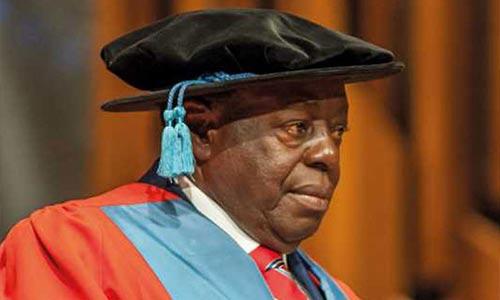Pathways To Sustainable Education In Nigeria

By AARE Afe Babalola, OFR, CON, SAN, LL.D (Lond.)
The office of the vice chancellor
In Nigeria, the statutes or establishment Acts of all universities provide for the principal officers and bodies of the university, including the office of Vice Chancellor. For the University of Lagos, this provision is to be found in Section 3(1)(c) of the University of Lagos Act. The functions of the Vice Chancellor are stated in Section 9 of the University Act which read as follows:
Functions of the Vice-Chancellor
(1) The Vice-Chancellor shall, in relation to the University, take precedence before all other members of the University except the Chancellor and, subject to section 6 of this Act; except the Pro-Chancellor and any other person for the time being acting as chairman of the Council. (2) Subject to sections 7 and 8 of this Act and the provisions of this Act relating to the Visitor, the Vice-Chancellor shall to the exclusion of any other person or authority have the general function, in addition to any other functions conferred on him by this Act or otherwise, of directing the activities of the University, and shall be the Chief Executive and Academic Officer of the University and Ex-Officio Chairman of the Senate.
The provisions of older Universities’ legislations are similar. A careful reading of the relevant sections of all the Universities legislations in Nigeria shows that the functions of a Vice-Chancellor primarily are:
To take precedence before all members of the university, except the Chancellor and Pro-Chancellor
To have the general function of directing the activities of the University
To be the Chief Executive and Academic Officer of the University
To be Ex-Officio Chairman of the Senate
The Vice Chancellor is therefore expected to know something about all aspects of the University. Literally, he must be a supper man. Vice Chancellorship is a demanding role that is highly visible internally and externally. He is expected to provide leadership academically, administratively and socially to all the officers of the University. He is to lead development activities including fund raising and the reinforcement of the University reputation and scope. He is to achieve the University’s objective in a timely, inclusive and purposeful way. He should exercise leadership to secure a sustainable financial base sufficient to allow the delivery of the University’s mission, aims and objectives.
In view of all the foregoing demands, a Vice Chancellor should have strong academic credibility, intellectual curiosity, sympathy for the values and culture of the University including the students and their concerns. A Vice Chancellor should not confuse public office with sources of making personal wealth. Indeed a corrupt Vice Chancellor does not make a good university leader.
A Vice Chancellor who is aware of these enormous functions and responsibilities ought to derive enough joy and satisfaction from the exalted position as Vice Chancellor and should be so proud of the power and responsibility bequeathed to him by virtue of his position as a Vice Chancellor so much so that he should be able to consider his status higher than other positions not only in the university campus, but also in the immediate community and the country at large and should derive enough satisfaction from the job to enable him shun other political appointments. As a successful legal practitioner, I coveted and considered my status in my profession higher than that of any political office holder so much so that I confidently and proudly refused offers of appointment as Federal Minister four times. Unfortunately, as would be shown later, the manner of appointment of Vice Chancellors reduces them to mere civil servants which ipso facto reduces the pride associated with the high position and makes them feel inferior and consequently ineffective in performance.
It was Lord Lugard in 1926 who said, “… The African of this race type loves the display of power but fails to realize his responsibility…”
What ails the Nigerian Vice Chancellor from achieving the laudable objectives inherent in the powers and functions stated herein and which are the causes of poor quality in our education system is the next item.
Government involvement in the appointment of VCs of public universities and the adverse effect on university autonomy and sustainability of education
In appointing a Vice Chancellor, the Governing Council of the university is required to recommend three candidates of the members of the university which in its own wisdom appoints one of the nominated persons without giving reasons. In exercising this exclusive and dominant power, the Visitor who does not have to give reason for rejecting the Council’s number one candidate some of the time appoints the second or third candidate on the list or appoints somebody outside the list.
Both in fact and in Law, the government is the Appointor of a Vice Chancellor of a public university. This constitutes a serious dent on the coveted and conventional autonomy of the Universities.
There is an adage which says “he who pays the piper dictates the tune”. It is therefore no wonder that many Vice Chancellors of public universities do not enjoy the independence of mind required to carry out their functions. Consequently, Vice Chancellors take orders from above. There are cases where Vice Chancellors receive letters from the top ordering them “to admit” unqualified students or “appoint” unqualified teachers. When I was the Pro-Chancellor of University of Lagos, my Vice Chancellor, late Prof. OyeIbidapo-Obe brought to me letters from Abuja directing that some unqualified students be admitted. I took the letters from him and replied that admission to University of Lagos was strictly on merit and not otherwise as long as I remained the Pro Chancellor of Lagos University. Only a Pro-Chancellor who did not beg for the job could do that.
Governing Councils
Another area of concern is the constitution and powers of Governing Council. A university Council is the governing and executive body of the university and it regulates all the affairs of the university either by way of policy making or by executing the statutory powers given to it under the Act. Unlike the Board of companies, corporate governance cannot go on in a university in the absence of the Council. There is statutory limit to what the Vice Chancellor can do alone. He cannot for instance appoint or promote or discipline principal and senior officers of the University single-handedly, nor dish out contracts above amount fixed by law. Governing Councils, much like Chancellors and Pro-Chancellors, owe their existence to the provisions of the various Acts of the Universities. A perusal of these Acts will reveal that the following functions are common to University Governing Councils:
- The Council of the University is responsible for the administration and management of the affairs of the university, including ensuring an effective system of internal control and is required to present consolidated audited financial statements each financial year.
- The Council is responsible for keeping proper accounting records which disclose with reasonable accuracy at any time the financial position of the university and to enable it to ensure that the financial statements are prepared in accordance with the university’s statutes;
- Ensure that there are appropriate financial and management controls in place to safeguard public funds and funds from other sources;
- Safeguard the assets of the university and to prevent and detect fraud; and
- Secure the economical, efficient and effective management of the university’s resources and expenditure.
To be continued….



